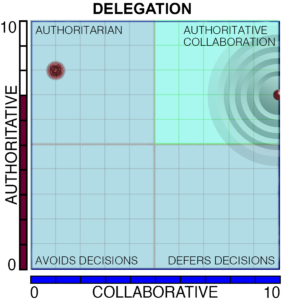
How Do You Teach Delegation?

One of the fundamental learning objectives in most leadership development training programs is delegation. But how exactly do you go about teaching delegation? Most emerging leaders are identified as top prospects because they excel at performing specific tasks. Their competence is what fuels their success; but when promoted, they are suppose to let go and stop doing the very tasks they have been rewarded for performing well. For some, delegating those tasks to others is is easy; and for others, it is a perpetual struggle.
The challenge for HR and training professional is determining how easily someone will learn to delegate tasks, especially under a stressful environment.
Delegation, which is a mix personality and skill, highlights the value of job personality assessments in leadership development. It is important to recognize a job personality assessment is not the same as general personality assessment. The fundamental difference is that a job personality assessment focuses on the behaviors related to the critical skills required for a specific job, whereas general personality assessment is much more general and lacks the specific job context.
An example of a job personality assessment is the Harrison Assessment. The Harrison Assessment was developed in 1990 and utilizes a proven mathematical model that measures 175 factors but includes a filter that enables you to select the specific job. This enables the user to focus of the key relevant traits. It also includes twelve key personality paradoxes that measure how people’s personality traits change under job stress. Dr. Dan Harrison, the creator of the Harrison Assessment, refers to this as the Paradox scale.

The graph above is an example of a Paradox Graph for the personality trait for delegation, which is a combination of Authority and Collaboration. This specific paradox graph is for an Associate Account Manager who was promoted to an Operations Manager. What this Paradox Graph shows is that this individual is naturally willing to delegate tasks. However, when under stress or when she feels a project is stalling, this individual becomes authoritative and falls back to her old role and does the tasks herself. This shift under stress is referred to as a Paradox Flip.
For the recently promoted Operations Manager, her Paradox Flip to authoritative was holding back her development. She went from being a “team player” to being perceived as a “mini-Napoleon”. However, with the help of her Harrison Report, the management team gained a better understanding to the cause of her behavior and a personal development plan was put into place to help her manage her reactions under stress. A few months later she was recognized with the quarterly “most improved” award.
By calculating the personality traits when someone is at a point of calm and at a point of stress, the Harrison Assessment provides managers and employees the behavioral awareness and self-awareness they need to improve their ability to communicate even when under stress.
Delegation is one of twelve paradoxes the Harrison Assessment measures. To learn more about the Harrison Assessment and its Paradox Technology, visit our website and download a sample Paradox report.
Check out my Facebook Leadership Success Toolkit if you would like to see more content like this and be part of an exclusive leadership network community
